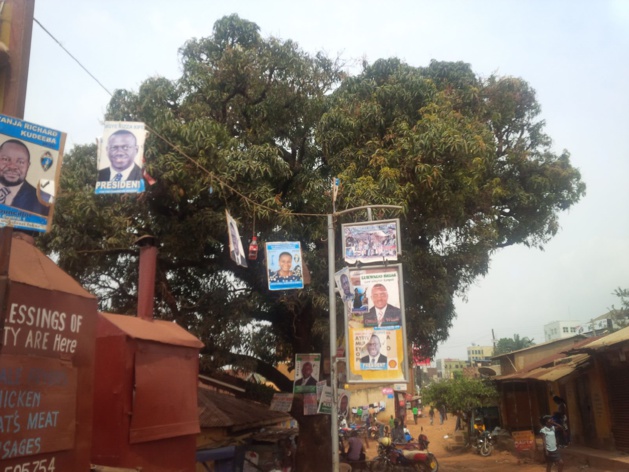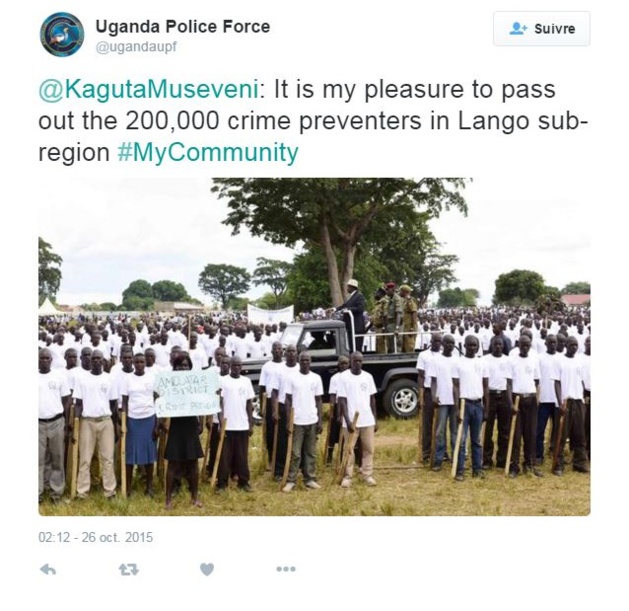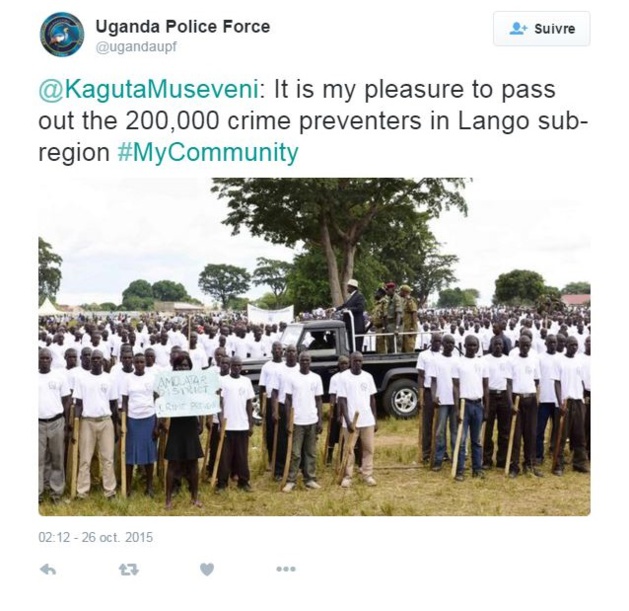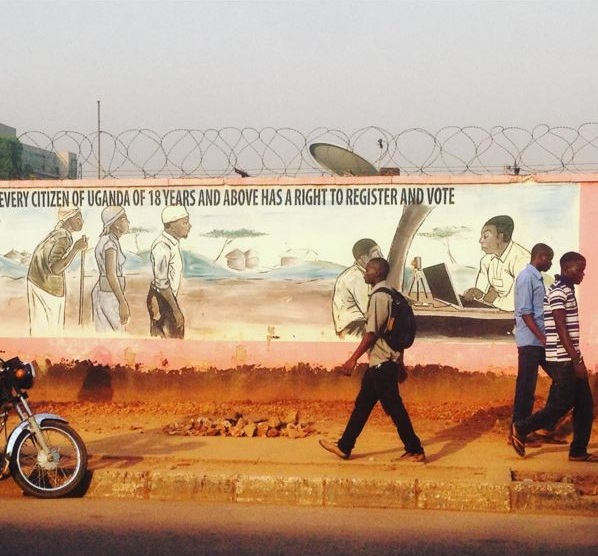
Credits Noé Michalon
Provocations and outbursts continue to multiply in both the speeches and actions of this election, as the seven opposition candidates begin to believe that a second round of voting seems increasingly possible. Such a result would be unprecedented in the history of Uganda; a country which has never undergone a non-violent regime change since it gained its independence in 1962. Even though the elections in 2006 and 2011 led to numerous protests by supporters of the opposition leader Kizza Besigye, contesting his defeat in the first round of votes, the mood in this election suggests that the current regime was trying to discourage all Ugandans from walking the streets.
A large military presence
Last year, the “Crime Preventers” programme saw the Ugandan government establish a real alternative police force; officially to fight against the instability of election time. The Human Rights Watch, which denounces the Crime Preventers, argue that the volunteer parapolice force is affiliated with the current ruling party, the National Revolutionary Movement (NRM). Its officers receive security training, and are armed with truncheons, although Museveni’s camp denies ever aiming to create a militia. With a target of 30 officers per village, it is believed that almost 1.5 million people are recruited to reinforce security in the country, contributing further to the militarization of the Ugandan streets, where soldiers and private security firms are already strongly present. Some statements – which are now disputed – even implied that the Chief of Police Kale Kayihura wanted to provide the Crime Preventers with firearms.
Other events have contributed to an even more oppressive atmosphere in this campaign. General David Tinyefunza, the president’s fellow traveller during the civil war that led Museveni to power in 1986, is now a dissident, and was imprisoned on Saturday without any reason being given to the public. A critic of the establishment, the General has close ties to the opposition, and is also known as “sejusa” (meaning “I regret nothing” in Luganda, the language of Kampala). Tinyefunza had already spent a year in exile in the UK, after condemning Mr Museveni’s ambitions to have his own son succeed him as president.
Problems with Dialogue
Prime Minister until 2014, the current opposition Amama Mbabazi has reported several intimidation attempts. The country’s head of security has been imprisoned since December, after accusations of attacks against supporters of the party in power, and some sources even claim that he is dead, whereas the presidential side suspects Museveni’s former right-hand-man-turned opposition to be running his own militia. This is why clashes often break out between supporters of the majority and those of the opposition, while disputes continue to occur over other issues. “Our sources of funding, worldwide and in Uganda are depleted by the president’s side, it gets really difficult to lead the campaign we had planned”, claims an anonymous member of the candidate’s team. Museveni’s campaign budget is twelve times higher than that of all his opponents combined. Trailing in the polls, Mr Mbabazi himself is no stranger to extravagant statements either, having declared in early January that a coup d’état could occur if the outgoing president rigged the elections.

Credits Clara Wright with the agreement of CrossWorlds
Dialogue between the seven opposition candidates and the established government has been further fragmented since the first presidential debate in Uganda’s history took place without the head of state, who described the debate as an activity “for school children”. Museveni’s disparagers did not hesitate to call him a “fearful dictator”; the words used by the president’s main challenger Kizza Besigye, who is second in the polls. These polls expect Museveni to be the winner with a score between 51 and 71% in the first round of voting. For his fourth candidature, his rival’s former doctor is facing pressures. Placed under temporary house arrest because of the police, he is often prevented from traveling to some cities to organize his meetings.
The lack of unity among the outsiders in this election has led to the opposition parties becoming the masters of their own downfall. Despite a long-standing agreement that a single candidate should lead the opposition, Mr Besigye and Mr Mbabazi ultimately failed to unite their campaigns under a single banner. Even beside the intimidation attempts and despite impressive rallies around the country by each of the main parties involved, the Ugandan electorate seems to be more disillusioned than ever. With three main candidates aged at 60, 67 and 72, the contenders for the presidency still represent the same generation which came to power in 1986. This might as well be an eternity, considering that 80% of Ugandans are under 30 years old, and so have only ever seen the same, familiar faces, both in power and running for the opposition.
We followed the elections in a Live Tweet































